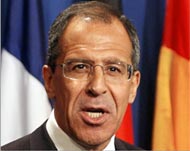Russia, Iran agree to continue talks
Russian and Iranian negotiators have ended a day of talks on Moscow’s proposal to enrich uranium for Iran with an agreement to continue negotiations.

Sergey Lavrov, Russia’s foreign minister, would not give any details of Monday’s talks in Moscow but said they offered some hope of keeping the issue within the UN nuclear watchdog, the International Atomic Energy Agency (IAEA).
The office of Igor Ivanov, Russia‘s presidential Security Council secretary, issued a terse statement saying that the Russian and Iranian negotiators had agreed to continue talks on the proposal, which is backed by the United States and European Union as a way of reducing concern about Iran‘s suspected intentions to develop nuclear weapons.
Kseniya Roshchina, Ivanov’s spokeswoman, declined to say when, where or on what level the talks would be continued.
The Iranian delegation was expected to head home on Tuesday, she said.
The Russian Foreign Ministry announced later that the talks will continue on Tuesday. It was not known whether these were the negotiations Ivanov’s office referred to, or simply low-level technical consultations before the Iranians depart.
Calls to the Iranian Embassy in Moscow went unanswered on Monday evening.
 |
|
Ivanov confirmed talks between |
After the talks, Lavrov said, Iran should resume a moratorium on uranium enrichment it broke last month and assuage international concerns about its nuclear activities.
He said Monday’s discussions gave reason to hope the issue could remain in the hands of the IAEA, rather than going to the UN Security Council.
“The talks are continuing,” Lavrov said. “We hope that they will define a perspective of keeping the situation within the IAEA framework.”
Last chance
The Russian offer, backed by the United States and Europe, was widely seen as the last chance for Iran to address the West’s concerns before a 6 March IAEA meeting that could start a process leading to punishment by the Security Council.
But Iran has defended its right to maintain a domestic enrichment programme, seen by the United States and other Western nations as a cover-up for a suspected weapons programme.
In Brussels, Javier Solana, the European Union’s foreign policy chief, said talks with Manouchehr Mottaki, Iran‘s foreign minister, failed to make progress on Monday.
|
“Honestly speaking, we have modest expectations, but we will make every effort to avoid an escalation of the situation and the use of force” Sergey Lavrov, |
After 90 minutes of talks, Solana said Iran‘s “substantive position has not changed. … They have to be much more constructive.”
Lavrov had sought to lower expectations before the Moscow talks.
He said: “Honestly speaking, we have modest expectations, but we will make every effort to avoid an escalation of the situation and the use of force.”
Analysts warned against expecting a decisive outcome on Monday, saying a concrete result would more likely emerge from further talks when Sergei Kiriyenko, the head of Russia‘s atomic energy agency, visits Iran on Thursday.
Experts have said Iran would like its scientists to have access to the Russian enrichment facility and hope to retain the right to conduct some part of the enrichment process at home.